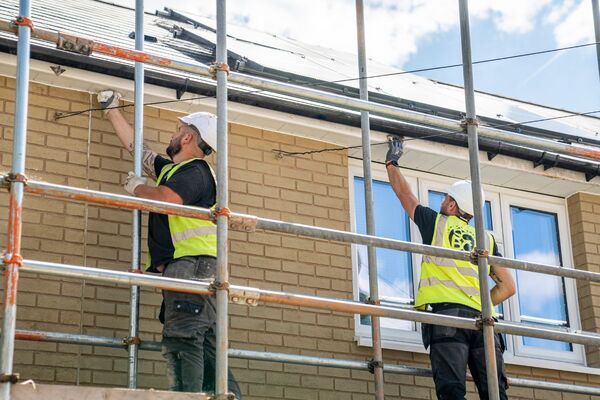You are viewing 1 of your 1 free articles
Social landlords step up use of carbon credits to fund retrofit work
The social housing sector is turning to carbon credits to fund retrofit, as landlords look for alternative ways to finance costly decarbonisation work.
Camden Council, Saffron Housing and Believe Housing are among the social landlords using retrofit credits via a programme run by social housing charity HACT, and carbon credit project developer PNZ Carbon.
The latest figures suggest that this retrofit credits programme funded the retrofitting of 16,667 homes across 37 social housing providers last year.
This equates to a carbon emission reduction of 15,123 tonnes, generating around £8.75m in social value, HACT said.
The programme works by turning the carbon reduction achieved from retrofit work – funded by schemes such as the Social Housing Decarbonisation Fund – into tradeable credits, each representing one tonne of carbon.
A retrofit company measures the reduction in carbon dioxide emissions achieved by the work from a baseline. The landlord can then register the credit with a body such as HACT, which sells it on to organisations looking to offset their own carbon emissions.
“To date, we have sold carbon credits from over 50 Camden homes on the offset market,” said Adam Harrison, cabinet member for a sustainable Camden at Camden Council.
The council was one of 22 social housing providers that participated in the carbon credit pilot, launched in 2022.
Camden-based organisations have used the credits – created from energy efficiency improvements made to local social housing – to offset their residual carbon emissions.
The scheme could be another way of funding the decarbonisation of UK housing – an enormous and expensive task that might see costs run to £18bn.
Matthew Grenier, business development director at HACT, said the programme is helping housing associations “accelerate the pace and scale of their decarbonisation programmes”.
“This year we will originate over 75,000 carbon credits: over the next 20 years, we estimate that this will result in over £75m being invested into the decarbonisation of the housing sector. In addition, this will equate to over £23m annualised social value,” he said.
“As a sector, there is more chance that we will get to net zero ahead of schedule.”
Marion Baeli, principal in sustainability transformation at architecture firm 10 Design, said that implementing retrofit at scale requires “a mixed range of solutions and financing mechanisms, which retrofit credits are part of”.
Yet concerns remain around the reliability of carbon credits in the wake of criticism over whether the credits actually correspond to a reduction in emissions. One investigation by The Guardian revealed that 78% of the top 50 emission offset projects were likely to be worthless in terms of offsetting carbon emissions.
Anna Moore, co-founder and chief executive of Domna, a retrofit company licensed to provide carbon credits, told Inside Housing: “Love them or hate them, VCMs [voluntary carbon markets] are here to stay.”
“They’re a big part of decarbonisation and they can help. But there are real risks of greenwashing,” Ms Moore said.
Another investigation by The Guardian, German weekly newspaper Die Zeit and SourceMaterial has criticised the value of forest carbon offsets from US-based non-profit Verra, a leading certifier of carbon credits, including the retrofit credits programme.
“[Carbon credits] can and should be a way to fund decarbonisation, but we have to be able to trust that the credits are actually real, and that they are really reducing CO2,” Ms Moore said.
To help get an accurate baseline, Domna uses research by University College London on the error rate of Energy Performance Certificate (EPC) estimates of energy consumption.
The 2023 study found that EPCs can overpredict energy use by up to 48%.
“Part of the reason why we like social housing retrofit is that you can look at and touch the projects,” Ms Moore said, adding that it is possible to “measure rather than just model” the reduction in carbon emissions.
HACT also restricts who can buy the credits with a vetting process, in a bid to keep the benefits local and make sure buyers have a similar ethical outlook.
“I think that gives comfort to housing associations and local authorities that the people who are buying the credits are aligned with their values,” Ms Moore said.
Buyers of the retrofit credits include the Economist Group and sustainable fashion brand Minnessak.
When it comes to the funding that retrofit credits could bring in, Mr Harrison pointed out that “the level of income remains low in the context of the total costs” because credits are “sold and retired annually”.
“Over the credits’ 20-year life we expect that the income will allow us to recoup between 10% and 20% of the retrofit costs,” he added.
To get around this problem, another way to fund retrofit with carbon credits is through pre-funding, an approach currently under discussion in the sector.
“Somebody who knows that they’re going to want to buy, say, 19 years’ worth of carbon offsets gives that money upfront, and then that lets the housing association fund work that they wouldn’t otherwise have been able to do,” Ms Moore said.
Although this is still at an early stage, future buyers could include corporates and real estate investment trusts.
Sign up for our asset management newsletter
Already have an account? Click here to manage your newsletters











